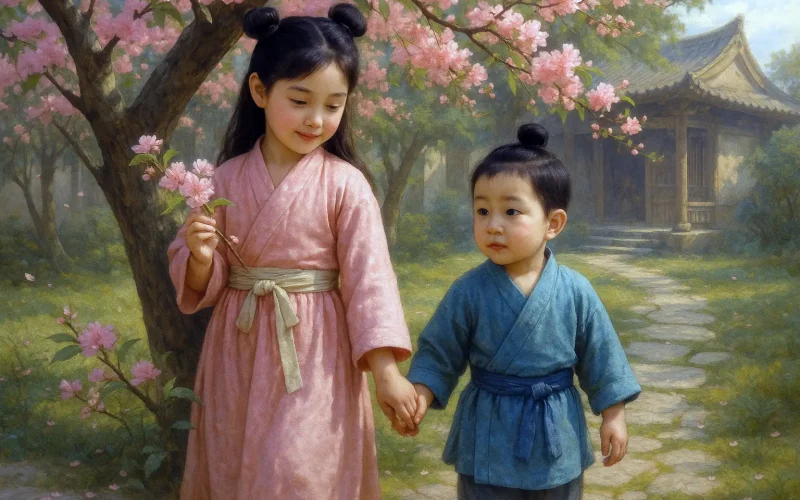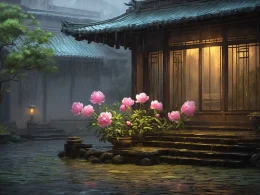From whose house has come the song of jade flute unseen?
It fills the town of Luoyang, spread by wind of spring.
Tonight I hear the farewell song of Willow Green.
To whom the tune will not nostalgic feeling bring?
Original Poem
「春夜洛城闻笛」
李白
谁家玉笛暗飞声,散入春风满洛城。
此夜曲中闻折柳,何人不起故园情。
Interpretation
This poem was composed by Li Bai in Luoyang, expressing the intense homesickness evoked by hearing a flute on a spring night. Having left his hometown in Sichuan in his twenties, Li Bai wandered extensively, and this long experience as a traveler far from home deepened his longing for his native place. The tranquility of the spring night and the melodious flute music touched the poet’s innermost feelings of nostalgia.
First Couplet: "谁家玉笛暗飞声,散入春风满洛城。"
Shuí jiā yù dí àn fēi shēng, sàn rù chūnfēng mǎn Luòchéng.
From whose house does the jade flute’s sound steal through the night, spreading with the spring breeze to pervade all Luoyang?
The opening line uses "whose house" to pose a question, while "steal" implies the unknown origin of the flute’s sound, adding a sense of mystery to the night. Instead of describing the source directly, the poet skillfully creates a hazy auditory atmosphere. The words "spread" and "pervade" vividly depict the flute’s sound carried by the spring breeze throughout the city, enhancing both the serenity of the spring night and the flute’s lingering resonance.
Second Couplet: "此夜曲中闻折柳,何人不起故园情。"
Cǐ yè qǔ zhōng wén zhé liǔ, hé rén bù qǐ gù yuán qíng.
Tonight, hearing "Farewell to the Willow" in the melody, who would not feel longing for their homeland?
"Farewell to the Willow" was a famous parting tune in ancient times, its mournful melody often used in farewell scenes. By referencing this melody, the poet evokes profound homesickness. The final rhetorical question elevates personal emotion to a universal sentiment of nostalgia, leaving a lasting resonance.
Holistic Appreciation
This work uses the "sound of the flute" as a thread, blending auditory and visual elements to integrate the flute’s melody with the spring night scenery of Luoyang. On this tranquil night, the flute’s sound stirs the poet’s deep longing for home. The phrase "steal through the night" highlights the mystery and suddenness of the flute’s sound, while its spread throughout the city demonstrates its wide impact. The mention of "Farewell to the Willow" deepens the emotional weight of the flute’s melody. The concluding rhetorical question universalizes the poet’s homesickness, making it relatable to all readers. The poem seamlessly fuses scene and emotion, with concise language and genuine feeling, epitomizing Li Bai’s artistic expression.
Artistic Merits
- Auditory Imagery as a Thread: The poem develops around "hearing the flute," progressing from the sound’s origin to its melody and the emotions it evokes, demonstrating rigorous composition.
- Imagination and Exaggeration: The flute’s sound "pervading all Luoyang" exaggerates its infectiousness; associating it with "Farewell to the Willow" deepens the theme of nostalgia.
- Fusion of Scene and Emotion: The nightscape, spring breeze, and flute music intertwine to create a moving picture, where the serene spring night complements the homesick sentiment.
- Subtle Language with Deep Emotion: The verses are concise yet profound, particularly "steal through the night" and "who would not feel longing," which are both elusive and deeply meaningful.
Insights
This poem reveals the deep homesickness of a traveler living far from home, conveying the ancient people’s attachment to their homeland. It reminds us to cherish family and hometown ties, and never forget the land where we grew up, no matter where we are. Additionally, by using natural scenery and musical associations to express emotion, the poem inspires us to leverage external elements in creative works to convey inner feelings, achieving a artistic effect where scene and emotion blend seamlessly with lasting resonance.
Poem translator
Xu Yuan-chong(许渊冲)
About the poet

Li Bai (李白), 701 - 762 A.D., whose ancestral home was in Gansu, was preceded by Li Guang, a general of the Han Dynasty. Tang poetry is one of the brightest constellations in the history of Chinese literature, and one of the brightest stars is Li Bai.












